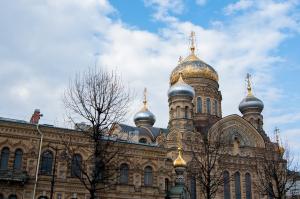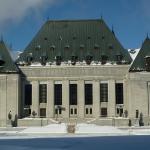
In the minds of a growing number of socially conservative intellectuals, classical liberalism—and, for that matter, constitutional republicanism—is beyond repair.
A flurry of recent books like Rod Dreher’s The Benedict Option, Ryszard Legutko’s The Demon in Democracy, Anthony Esolen’s Out of the Ashes, Charles Chaput’s Strangers in a Strange Land, and Patrick Deneen’s Why Liberalism Failed (as well as Mark Mitchell’s forthcoming volume along similar lines) has, both explicitly and implicitly, called the sustainability of the current political order into question. This emerging skepticism constitutes something of a sea change in the worldview of American social conservatives. Gone is the goal of restoring constitutional principles or preserving the wisdom of the Founding Fathers. Gone too is any trace of Richard John Neuhaus’ attempt to link human flourishing with market freedom. Instead, these new thinkers are taking aim at the principles of the American founding itself, principles which (in their accounts) must inevitably lead to a morally decrepit “illiberal liberalism.”
The particular locus of their critique is the set of social phenomena that figures on the left have often derisively labeled “late capitalism” or “neoliberalism”—that is, globalization, deregulation, technological advancement, and a degree of cultural homogeneity. According to these conservative writers, in a society where such practices persist, the promise of “individual liberty” will morph inevitably into alienation from community, social atomization, and a corresponding expansion of the authoritarian state. For Deneen, contemporary political liberalism hinges on “two revolutions—its anthropological individualism and the voluntarist conception of choice, and its insistence on the human separation from and opposition to nature . . . . Liberalism thus culminates in two ontological points: the liberated individual and the controlling state.”
These conservative authors’ works have been discussed at great length elsewhere, and I have no intention of merely regurgitating the content of their books. What intrigues me is their general reluctance to articulate a coherent “postliberal” project within the moral frameworks to which they subscribe. Fascism and communism, as Deneen and others point out, have been properly consigned to history’s dustbin—but if we throw out liberalism too, what political vision will replace it? Plenty of ink has already been spilled over these writers’ theologically-inflected “decline narratives.” Far less attention has been paid to the theory they foreshadow.
* * *
At the moment, the general “postliberal” conservative consensus seems to be a vague sort of localism or communitarianism, a return to small-scale habits of life. Deneen advises “a future of self-limitation born of the practice and experience of self-governance in local communities.” James K. A. Smith echoes this in his recent volume Awaiting the King, where he describes the local church as a potential “counter-polis of resistance” to the iniquities of a secular order. And for his part, Dreher opines that “[i]f there is going to be renewal, it will have to happen in families and local church communities.” Given how badly civil society has broken down over the last several decades, I share these writers’ concern for the restoration of local life. But their support for such communities as a substantive counterweight to the existing political order sits uneasily with their criticism of liberalism qua liberalism.
What keeps “intentional communities” from tearing themselves, and one another, apart? Carol Weisbrod’s brilliant (if long-forgotten) study of utopian religious communities in nineteenth-century America, The Boundaries of Utopia, is particularly illuminating. In her book, Weisbrod carefully surveys the history of American litigation involving utopian communities (the Shakers, Oneida, etc.). Many of these suits involved attempts by disgruntled ex-members to reclaim previously donated assets or recover damages against their former neighbors. Obviously, the existence of any disgruntled members poses a problem for any communitarian political or social project. If local communities are to maintain the kinds of “thick” social practices and norms that Deneen, Dreher and others identify as essential, they must possess enforcement mechanisms sufficient to preserve discipline. A community member who donates a sacramental chalice and later becomes disillusioned cannot claw back the chalice and expect to remain a member of the community in good standing; the enforcement of internal discipline must, at some level, involve meaningful consequences. These consequences, in turn, will necessarily require some coercive force (for instance, a restraining order against an ex-member who threatens violence against his former companions).
Crucially, Weisbrod explains that, for the American utopians, this coercive force was modulated through the secular legal system—and, in most cases, secular courts vindicated communities’ right to police themselves. This suggests that the survival of local communities with the power to self-regulate is contingent upon the existence of a larger “meta-community” through which coercive force is regulated and administered. Conservatives’ current postliberal alternative thus finds itself enmeshed in paradox: the very communities necessary for a thriving social order will end up dependent upon the political institutions of liberal democracy.
What happens, though, when liberal democracies pass “illiberal” laws restricting associational freedom? What happens when judges uphold those illiberal laws? Postliberal localists are seemingly caught in a pitiless catch-22: civic virtue cannot flourish without intentional communities, but institutional communities’ ability to set and enforce their own terms of membership is dependent upon the democratic whims of a populace lacking such virtue.
But one can readily attack the premises of this argument: must liberal democracy really become monstrously authoritarian? Deneen, for one, treats governmental bloat as inevitable, but it’s far from obvious that the mere concept of “rights and liberties” necessarily entails an activist state. One can’t help wondering whether a narrower approach by judges to legal interpretation would have dramatically limited the growth of state power (as any constitutional originalist worth their salt could readily explain). Indeed, the challenges posed by a pure democracy were largely anticipated by the American Founders, who codified certain bedrock liberties in a difficult-to-amend founding document. These rights and liberties (particularly freedom of association) rest at the heart of the communitarian vision favored by liberalism’s conservative critics.
Given my own affinity for constitutionalism—a philosophy that underpins and protects community formation, and that itself rests on liberal-democratic premises—I don’t find the “localist turn” especially persuasive as a full-scale alternative to liberal democracy. It makes more sense to conceive of communitarianism as a distinct pattern of life within the broader political project of liberal democracy, not an alternate political theory in its own right.
* * *
Moving beyond the communitarian paradigm, some conservatives have voiced a sharper critique of liberal democracy. Free markets and mass consumption, their argument runs, necessarily strip communities of the ability to achieve any collective good: if everyone generally acts in their own “enlightened self-interest,” and society is structured around the assumption that they will do so, how can communal goals be pursued at all? This dilemma, some writers have concluded, calls for a radical rethinking of modern political theory.
Just how radical, though? Speculation is always a dangerous game, but here is my controversial prediction: in the next 2-3 years, a not-insignificant number of conservative political theorists will gravitate toward support for an express synthesis of church and state, with all its ensuing consequences. I will call this ideology neo-integralism (most of its proponents wouldn’t use the prefix, but insofar as neo-integralism tries to resurrect a prior, premodern relationship between church and state, the additional descriptor makes sense). Neo-integralism, unlike what most Americans conceive of as “conservatism,” will willingly grasp the nettle of authoritarian politics, favoring state control of markets and close regulation of personal behavior. Most controversially, neo-integralism will ultimately dictate that political/spiritual leaders take an axe to the perceived taproot of liberalism: religious freedom.
I am well aware of the bitter irony, and facial implausibility, of my hypothesis. In many conservative quarters, liberalism is conceived as a threat precisely because of its corrosive effects on religious liberty (consider Burwell v. Hobby Lobby, Zubik v. Burwell, Masterpiece Cakeshop v. Colorado Civil Rights Commission, and so on). Yet neo-integralism, when fully flowered, will push this idea a step further: the problem is not that the state oppresses religion, but that religion has to jockey for space in the public square at all. In the minds of the neo-integralists to come, John Locke’s Letter Concerning Toleration—and the subsequent conceptualization of religious freedom as an intrinsic good—will be identified as liberalism’s original error.
Why might this shift occur? Freedom of religion is, at bottom, the freedom to come to diverse conclusions about the ultimate destiny of reality—and, in a regime sanctioning the free exercise of religion, the freedom to act meaningfully on those conclusions. I would go so far as to suggest that a robust view of religious liberty necessarily restricts the power of any political leader to articulate a “thick” vision of the common good—a vision toward which all members of the community may be morally compelled to labor. A regime allowing space for divergent views of the eschaton (that is, the ultimate telos or purpose of humanity) to flourish is a regime that inherently circumscribes a political leader’s power to immanentize any eschaton at all: to what shared philosophical foundation can such a leader appeal?
To summarize all this: the new wave of conservative critiques of liberalism is largely predicated on liberalism’s perceived failure to preserve the “common good.” Divergent views of the Ultimate Good (that is, God), which are a necessary consequence of freedom of conscience, will necessarily thwart political leaders’ ability to organize citizens around a temporal “common good.” As a result, those who seek to elevate the concept of a “common good” over the subtler achievements of liberal democracy must ultimately stake out positions opposed to religious liberty itself.
As a Lutheran, I myself am comfortable with a degree of tension between the political and the transcendent—and I don’t find it especially difficult to make a theological case for freedom of religion. As theologian Paul Griffiths has written, in the realm of human reasoning there will inevitably be a degree of discontinuity between the “order of being” and the “order of knowing.” That is, when faced with a given question, we may recognize that an answer exists while acknowledging our incapacity to grasp it fully. Accordingly, we ought to adopt a posture of humility regarding our own limited (though certainly not nonexistent) ability to apprehend the truth. Freedom of conscience follows from this: it acknowledges God’s “infinite qualitative distance” from the ordinary objects of human knowing, such that individuals may reasonably reach different conclusions about the nature, purpose, and end of reality. (And for those looking for support for religious liberty in the biblical text itself, Luke 9:51-56 proves instructive: when Jesus and his disciples encounter hostility and rejection in a Samaritan village, the disciples James and John call for divine vengeance against the town, but Jesus immediately rebukes them and no more is said.) It is difficult to conclude that coercion of conscience is a necessary part of the Christian tradition.
But I’m fairly certain that some writers will conclude otherwise when faced with liberal democracy’s perceived deficiencies. These writers will adopt an increasingly sanguine view of past church-state alliances (Andrew Willard Jones’ recent book Before Church and State is the first of many to come in this vein) and express contempt for the “liberal” value of religious freedom. That said, many conservative thinkers (Princeton’s Robert George, a former chairman of the U.S. Commission on International Religious Freedom, springs to mind) will never make the “neo-integralist turn”—but some probably will. Time will tell if the neo-integralists of a “high church” bent will end up making common cause with old-school Reformed theonomists like Rushdoony, Bahnsen, and others; if nothing else, the neo-integralists will cut more “respectable” figures in the public eye.
* * *
In the months and years to come, it will be tempting for conservative writers to pile onto the end-of-liberal-democracy narrative I’ve sketched here. Indeed, many already have: there’s a certain seductive appeal to all such accounts of decline, decadence, and ruin. But all too often, these critics overlook the value of the procedural norms and limitations on coercive power that allow self-sustaining, self-policing communities to develop. By exercising a monopoly on the use of force, liberal democracy provides the space for “thick” localism to flourish undisturbed, as Weisbrod has explained in depth.
And even liberal democracy’s most zealous critics ought to resist the temptation of a darker alternative. Neo-integralism may appear alluring as a postliberal political theory—insofar as it allows political leaders to assert a “common good” that can compel moral allegiance—but it will exact a terrible price: the rejection of the very value that underpinned the case against liberalism in the first place.
Those philosophical conservatives who cherish the foundational principles of liberal democracy—most centrally, religious liberty—should ready themselves for a challenge from the right. The neo-integralists may show up sooner than they realize.












